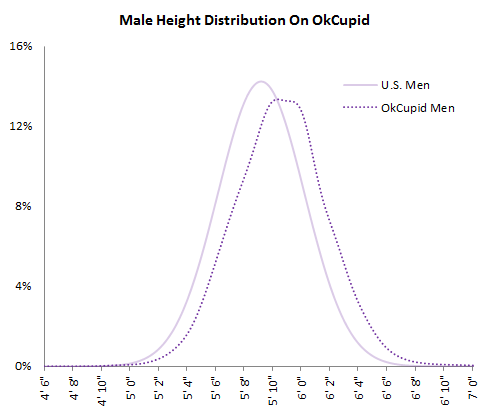Online dating site OkCupid continues with amusing yet thorough analysis of their 1.51 million users. This time around, they cover the lies people tell:
People do everything they can in their OkCupid profiles to make themselves seem awesome, and surely many of our users genuinely are. But it’s very hard for the casual browser to tell truth from fiction. With our behind-the-scenes perspective, we’re able to shed some light on some typical claims and the likely realities behind them.
Among the findings:
- People exaggerate their height by about two inches.
- If someone says they make $100k per year, they probably mean $80k.
- The more attractive a picture, the older it is.
- Most self-identified bisexuals (80%) only like one gender.
Buyer beware.


 Visualize This: The FlowingData Guide to Design, Visualization, and Statistics (2nd Edition)
Visualize This: The FlowingData Guide to Design, Visualization, and Statistics (2nd Edition)

While I don’t doubt the exaggeration of height and salary on dating sites, I honestly dont know what the “average” distribution looks like for height in the US. Where did they get the source of this distribution?
Also, it is not reasonable to assume that OkCupid men are a random sample of U.S. men.
– They probably are younger than the total population. Later generations are taller on average than older ones. Thus people on dating sites probably actually are taller.
– Poor people use the internet less or not at all. So you can expect the users of a dating site to have higher incomes.
How many more differences can you think of. It’s easy to find a dozen.
True, but with a sample size of 1.5 million, there’s some credibility to the argument.
Unfortunately not. If the sampling procedure is systematically biased as it is here (in the form of self selection and thus oversampling of specific groups), the sample size does not change anything at all.
It //would// decreases the size of your confidence interval if it was a random sample, sure. But it is not and you simply cannot compare the two data sets unless you use some form of matching procedure.
Smack: right. And there could be basic differences between the general population and single people, too. E.g.: Are wealthy people more likely to be single in their 50’s? I wouldn’t expect that to be a big effect, but I wouldn’t be surprised if it’s there.
Pingback: dating
Pingback: Lies people tell in online dating | RSS Lens